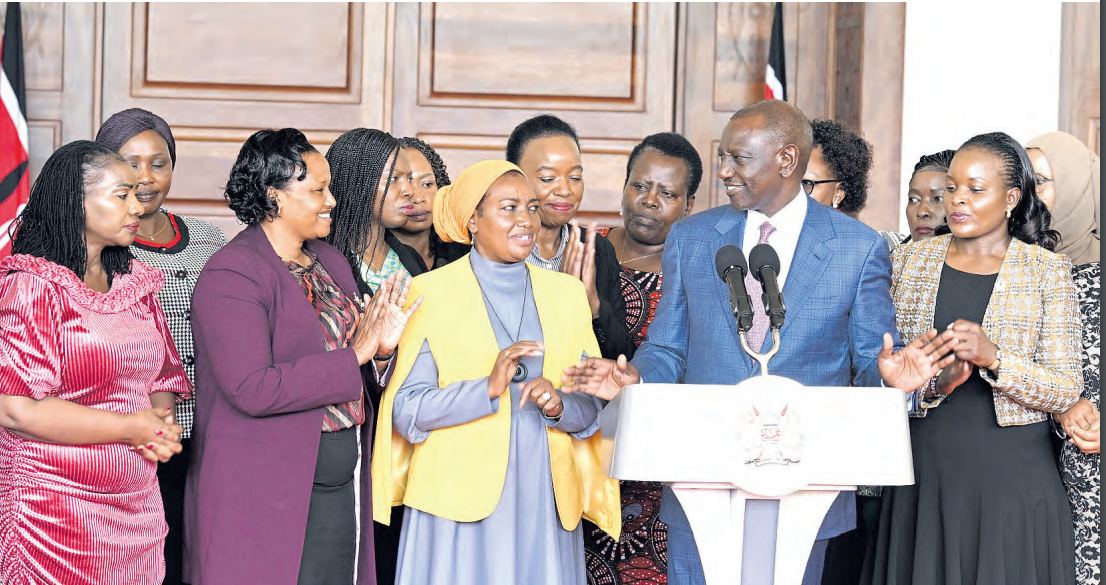
What Ruto told state officials on performance contracts
He met officials on November 19 at State House
"Life is getting worse day by day. Many of us are struggling to afford a simple meal in a day."
In Summary

Although the inflation rate dropped to a 17-year low in October to 2.7 per cent, the majority of Kenyans who spoke to the Star said they were yet to feel the impact of the deceleration, with most of them struggling to procure a single meal for their families.
Edward Waiganjo, a boda boda operator along Waiyaki Way in Nairobi, hopes those who advise the presidency on economic matters have presented him with the true picture of the cost of living, which he describes as wanting.
“Let them tell Ruto the truth, so that he speaks from the point of knowledge. Life is getting worse day by day. Many of us are struggling to afford a simple meal in a day,” Waiganjo said.
Mercy Mutua, a kiosk operator in Westlands, echoed the sentiments, saying the government is detached from the people.
“I saw graphics indicating that food prices have dropped, with the Government Spokesperson saying that a 2kg packet of sifted maize flour is now retailing at Sh100, sugar Sh120 and a 6kg cooking gas at Sh1,000. Let us not joke with our hunger and anger. I hope Ruto will desist from usual rhetoric,” Mutua said.
Business operators expect the President to address over-taxation, which has seen many either close or slash operations while others are engaged in a cat-and-mouse chase with auctioneers.
Although the Gen Z-led protests in June saw Ruto withdraw tax-raising measures for the current financial year, his administration has introduced several levies that have pushed up the overall cost of doing business.
To rub salt into the injury, the National Treasury has proposed fresh tax measures as the government races against time to fill a huge budget deficit and cut borrowing.
The Tax Amendment Bill, 2024 proposes a Significant Economic Presence Tax, a new levy for non-residents who earn income from services provided in Kenya through digital marketplaces.
It also seeks to raise excise duty on internet and telephone calls to 20 per cent up from 15 per cent. President Ruto’s government has also proposed a five per cent withholding tax on local sales promotion, marketing and advertising services.
Others are an increase of Railway Development Levy by 100 basis points to 2.5 per cent and a minimum top-up tax of 15 per cent for multinationals.
Business lobby groups led by the Kenya Association of Manufacturers and Federation of Kenya Employers are hoping that Ruto will listen to the concerns and provide leadership that will foster economic growth.
On Tuesday, the Petroleum Institute of East Africa pushed for the removal of any new levies that are outside licensing requirements or those imposed on petroleum.
The institute argues that lack of harmonisation between county and national regulations has created conflicting requirements, leaving businesses struggling to navigate the complex system.
In a submission to the Senate Committee on Transport, PIEA said currently industry players are required to secure multiple licenses and permits, with fees differing from one county to another.
Employees who have lost almost 40 per cent of their pay slips to taxes will be keen to hear how the broad-based government plans to improve their lives, with essential services like education, healthcare and roads in a deplorable state.
Yesterday, the ongoing lecturers’ strike entered the third week, with learning paralysed in public universities across the country.
At the heart of the fight is the 2022- 25 CBA, which they claim the state has reneged on. The lecturers were to get a salary increment of between seven and 10 per cent as part of the 2021-2025 collective bargaining agreement, but the government has only signed for 4.5 per cent, which is yet to be disbursed.
This is the second lecturers’ strike in two months following one that was suspended on September 26.
Patients are grappling with a compounded healthcare crisis as the rollout of the new Social Health Insurance Fund continues to face a myriad of challenges.
Those who spoke to the Star want the controversial national cover done away with and a quick restoration of the previous National Health Insurance Fund.
Although employees are paying
2.75 per cent of their income to
the new Fund, services rendered
are way too low, the say.

He met officials on November 19 at State House